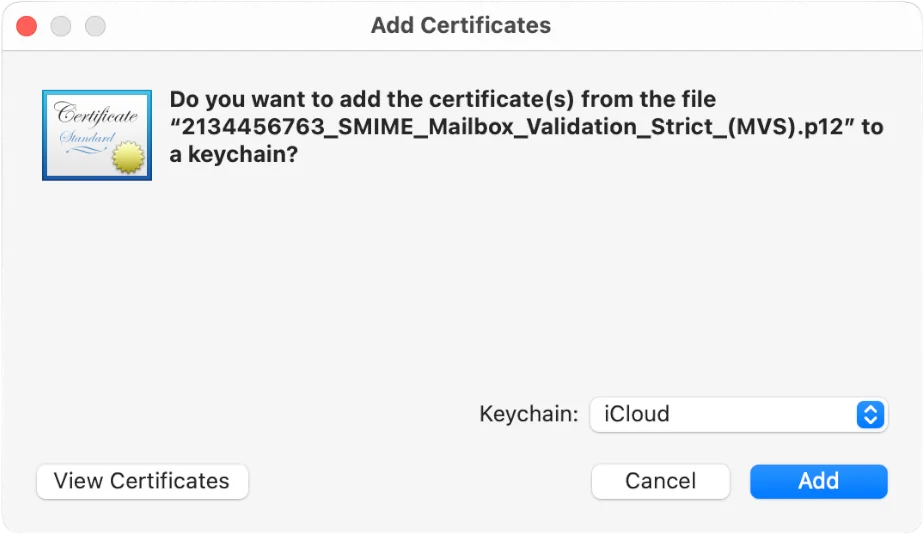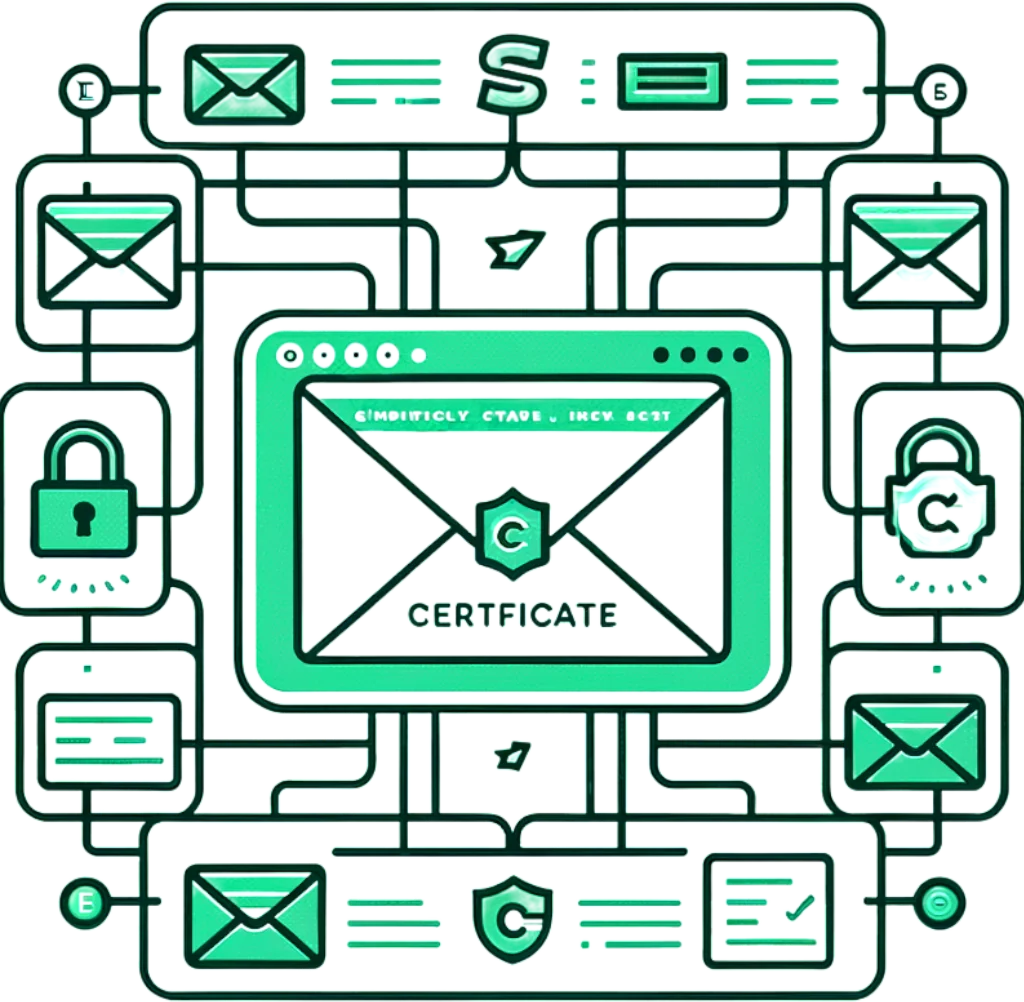Compatible Email Clients
- Microsoft Outlook - 2019, 2016, 2013 and Office 365 versions supported.
- Apple Mail - Built-in client for Mac OS.
- Mozilla Thunderbird - Open source cross-platform application.
- iOS Mail - Default email app on iPhones and iPads.
- Gmail App - For Android mobiles and tablets.
- Others - eM Client, MailMate, Postbox, etc. May require plugins.
Prerequisites
- Up-to-date OS and software (patches, security fixes, upgrades).
- Root certificates installed for validation.
- S/MIME enabled in email client.
- Certificate installed properly in store.
Installation Steps
- Double click certificate file, click Install Certificate.
- Place in Personal certificate store.
- Enable S/MIME in email client settings.
- Select installed certificate.
- Restart email client.
Steps can vary across operating systems, email clients and versions. Refer documentation for specifics.
Contact IT team for assistance if needed. Proper installation is key to utilizing S/MIME certificates.
Additional Considerations
- Compatibility with legacy OS versions - Windows XP, Vista; Mac OS X 10.8 and older.
- Support for outdated or deprecated email clients.
- Integrating with on-premise Exchange/Office 365 servers.
- Root certificate management if using private/enterprise CAs.
- Policies around S/MIME usage within organizations.
Evaluate thoroughly before deployment to ensure system requirements are adequately met.
Email is a pivotal communication and collaboration tool for businesses today. However, standard email lacks encryption and is vulnerable to cyber threats like data breaches, spoofing, phishing attacks and more. This is where S/MIME certificates come in - they allow securing email through encryption and digital signatures.
Definition of S/MIME Certificates
S/MIME (Secure/Multipurpose Internet Mail Extensions) certificates utilize public key cryptography to provide encryption and signing of emails. They help protect the confidentiality and authenticity of email messages.
Some key features of S/MIME certificates:
- Email Encryption - The contents of emails can be encrypted so only the intended recipient can decrypt and read the message. This prevents unauthorized access if emails are intercepted.
- Digital Signatures - The sender's identity can be verified through their digital signature proving the email originated from them. This prevents spoofing.
- Tamper Proofing - Any changes made to an encrypted email will invalidate the signature alerting users to tampering. The integrity of the email is maintained.
- Non-Repudiation - The sender cannot later deny sending the email since their signature mathematically proves they sent it.
- Standard Protocol - S/MIME is an open standard supported by many email clients and platforms.
Benefits of S/MIME Email Security
Here are some top benefits of using S/MIME certificates for email security:
- Protection against data breaches - Encryption prevents unauthorized access to emails.
- Stop phishing and spoofing - Digital signatures validate sender identity.
- Privacy and confidentiality - Encrypt sensitive emails to customers, partners, etc.
- Compliance - Meet regulations like HIPAA for securing healthcare communications.
- Authenticity of emails - Signatures prove integrity of email contents.
- Non-repudiation - Undeniable proof of source and delivery.
- Standard protocol - Supported across many clients and platforms.
Main Use Cases
Major use cases for S/MIME encryption include:
- Healthcare organizations - Secure PHI in emails to meet HIPAA.
- Financial institutions - Encrypt sensitive financial data being shared.
- Government agencies - Protect confidential communications.
- Legal firms - Attorney-client privilege requires email privacy.
- Businesses - Safeguard proprietary data, trade secrets, HR info etc.
S/MIME works for any scenario where email security and authenticity are important.
How to Get an S/MIME Certificate
Here is the overall process for getting an S/MIME certificate:
- Generate a Certificate Signing Request (CSR) on your system. This contains your public key.
- Submit the CSR to CyberSSL.
- Verify your identity according to the CA's validation process.
- The CA will issue your S/MIME certificate containing your validated identity and public key.
- Download and install the certificate on devices you will use for S/MIME email.
- Enable S/MIME in your email client settings.
- You can now send encrypted and signed emails using your S/MIME certificate.
We recommend getting S/MIME certificates from an established, trusted Certificate Authority. The CA will handle validation processes like organization vetting, domain control validation, identity verification etc. to confirm you are who you claim to be.
Major Email Clients Supporting S/MIME
Most popular email apps support S/MIME right out of the box or via plugins including:
- Microsoft Outlook and Office 365
- Apple Mail
- Mozilla Thunderbird
- Android and iOS Mail apps
- IBM Notes
- Novell GroupWise
- Qualcomm Eudora
And many others. Check your email client's documentation for how to enable S/MIME encryption and signing.
System Requirements for S/MIME Certificates
To use S/MIME certificates, your operating system and email client need to meet these minimum requirements:
- Windows 7 or newer, macOS 10.12+, Linux, iOS 11+, Android 5+
- Up-to-date OS and software (latest security patches)
- Email client with S/MIME support
- S/MIME enabled in email client settings
- Root certificates installed for validation
- Certificate installed in appropriate store
Follow your CA's installation guides for specific steps to install and configure the S/MIME certificate on your system.
Migrating Existing S/MIME Certificates
If your organization is already using S/MIME certificates, these tips will help transitioning existing certificates:
- Audit current S/MIME usage - what certificates are in place, who is using them, any issues etc.
- Assess renewal timing - When will existing certificates expire? Plan new deployments accordingly.
- Determine new CA - Select a new provider for upcoming certificate needs.
- Test compatibility - Ensure new CA's S/MIME certificates work with existing clients/systems.
- Plan rollout - Gradually deploy new certificates alongside existing ones to avoid disruption.
- Update procedures - Update internal documentation/processes referencing old certificates.
- Support transition - Help desk should assist users move to new S/MIME certificates.
A staged migration while old certificates are still valid allows a smooth transition to new CAs.
The Power of S/MIME Email Encryption
Email is critically important for business, but also vulnerable to threats like hacking, spoofing and spying. S/MIME certificates provide robust encryption to secure email communications.
Prevents Unauthorized Access
S/MIME encrypts email messages end-to-end. Only the intended recipient can decrypt and read the content using their private key. Network sniffing or account hacking can't expose encrypted emails.
Authentication of Senders
Digital signatures tied to S/MIME certificates authenticate the sender's identity. Recipients can verify the email came from the expected sender and has not been tampered with.
Compliance and Audit Trails
Encrypted, authenticated email helps demonstrate compliance with regulations like HIPAA and GLBA. S/MIME provides verifiable audit trails for sensitive communications.
Why We Offer Affordable Cheap S/MIME Certificates
Email encryption is crucial today for security and compliance. But some organizations have limited budgets for cheap S/MIME certificates to enable encryption.
That's why we provide affordable, budget-friendly S/MIME certificate options tailored to different needs:
2-Years Certificates
Our 2-years S/MIME certificates cost approximately 30% less than 1-year certificates. This saves you money upfront while still providing robust email encryption at a cheape price.
And you'll not need to renew the certificate frequently. But for small teams, 1-year validity can be ideal.
Volume Discounts
If you need cheap S/MIME certificates for multiple users, our volume discounts can save you significantly.
The more certificates you buy at once, the lower the per-unit cost.
We pass on savings from bulk certificate orders directly to you.
Bundles
You can bundle cheap S/MIME certificates with other products like SSL/TLS certificates for additional discounts. Bundling allows optimizing savings.
And we frequently run promotions with discounted pricing on cheap S/MIME certificate bundles.
Expert Guidance
Our SSL certificate experts will advise you on the most cost-effective S/MIME solution for your specific needs and budget.
We help you maximize email security within your budget. No need for expensive wildcard certificates.
With customized recommendations and pricing, we make robust S/MIME email encryption affordable for organizations of all sizes and budgets.
Contact us today to explore budget-friendly options for securing your email with cheap S/MIME certificates.
















